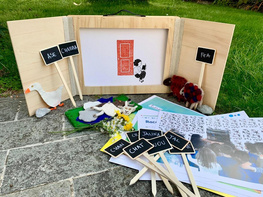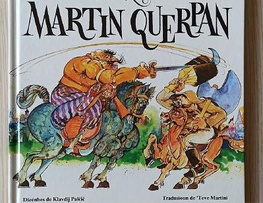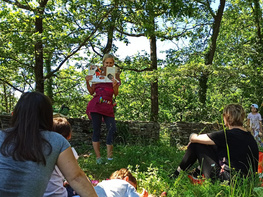The Occitan, since ancient time, has known a real literary fortune, just think of troubadour poetry.
In the valleys of Piedmont, except for some cases, Occitan has instead seen a literary flourish only from the second half of the last century thanks to the work of some local poets and writers.
In stura Valley. However, there are some evidences of the use of Occitan written before the 20th century.
Particularly, reference can be made to the transaction relating to the borders between the district of Aisone and that of Vinadio of 1533 written on parchment, contained in the archive of Vinadio and the will of the 15th century found in the Parish archive of Pontebernardo.
Finally, it is highlighted the existence of a literary text recovered by A.M. Riberi in the 30s, together with other Occitan material, at the Parish archive of Argentera, attributed to the 16th century: the famous “Nové dell’Argentera”, a typical text linked to the tradition of Provencal pastoral care or sacred drama.
Jes vengu na gazeta
totoura de nouvel,
jes vengu n’ange dau ciel,
dis che na vergineta
na fa n’efan che teta,
io pa ren de plu bel
Pastours de l’Argentiero
caloun d’en aut en bas,
portoun fourmage gras
dedin la formagièro
per far la presentièro
au bon Gesù ch’es nas.
(News has come / just now/ an angel has come from heaven, / says that a virgin / has given birth to an infant child / there is nothing more beautiful... Argentera shepherds / descend from top to bottom / bring fat cheeses / to the cheese bowl / to offer them to the good Jesus who was born)
However, despite the presence of this ancient documentation, the real Occitan literary growth in Stura Valley occurred only in the second half of the last century, thanks to a series of local authors.
First, it should be remembered Beppe Rosso - problably the gratest poet of the valley – called Bep Rous, born in Borgo San Dalmazzo (1935-1995) but originally from the “Vallone dell’Arma”, who wrote a series of important poems both in the local Occitan and “piemonese”, collected in a posthumous volume by his friends “I mìou journ/lj mèdi/my days”. Beppe Rosso also wrote some Occitan short stories, among which it is important to remember Lou Sihoun, who appeared in novel temp magazine (n. 3 of January 1977) and “The history Magou Sabinou” volume edited by Lucia Norbiato.
Another important poet, of whom little is known, except that he was originally from Ferrere and who died in 1966, is Gabriele Giavelli, whose poetry, simple and seasoned with village philosophy, portrays, through a series of small paintings, moments of life of his country of origin.
Also, of great importance is the poetic work of Albino Barrel (1936-2019), originally from the hamlet of Saint Bernolfo of the district of Vinadio, whose works are characterized by a poetic inspired by the return to a simpler life, to the most elementary desires, to the essentials, in which one can meet the most frank and real joys, which are based on his memories of childhood. His poetic and prose work in Occitan was collected in the recent volume “I a carcaren ilamoun” (2017).
We still remember the works of Giovanni Monaco (1915-2007), called Janot ‘d la Donia, partisan and teacher of Valloriate, whose poetic work traces the like of small hamlets and gives “valourian” a poetic dimension. His works were collected in the volume “L’era pé jo bel issì”, edited by Lucio Monaco.
Finally, we also mention the translation of the story by the Slovenian author Fran Levstik “Martin Krpan” made by Stefano Martini (Martin Querpan), in the Occitan variant of Pontebernardo, following the Stornway conference (Hebridies Isles) in 1987, at which he had discussed publication for children in the lesser-used languages.
Martin Krpan’s Occitan translation, a tale of the feast and adventures of Martin Querpan, a man with extraordinary physical strength, is certainly one of the most successful works in Occitan translation of the last century.



